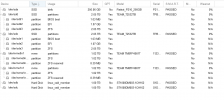I am running Proxmox VE 7.3-3 on an old repurposed HP Z640 workstation (Xeon E5-2690v3 chip, 48 GB of ram, and three drives all connected by SATA III: a 256GB SSD currently used for the boot drive/proxmox root, a 1TB SSD drive used for VM and CT storage, and 1TB HDD used only for ISOs CT templates currently-all formatted as EXT4). This is not a production box, and I have no issue wiping the drives and starting over. I am using this box for home lab and tinkering purposes only at the moment. I only run it a couple of hours a day and it is not doing anything super important. My NAS runs on different hardware at the moment which is running 24x7. I have 1 TB of storage on the NAS served up via SMB/CIFS and backed up locally every 15 minutes and offsite to AWS S3 every night. I may at some point migrate the NAS to this box and also spin up VMs or docker images to run pfsense, openVPN, and a few other services on a more permanent basis.
SO, with all that being said, what are your suggestions for how to configure the storage on the HP Z640? I am guessing some kind of LVM would be better than what I am doing. I am not sure I am ready to take the leap into ZFS yet, but maybe, who knows? I am still pretty new to Proxmox. This box has been running for only a couple of weeks now, and I have installed a few VMs (windows 11, Linux Mint 11, Kali, and Ubuntu server). I have also installed docker a couple of different ways (in Ubuntu and in an LXC container), and wordpress in an LXC container. SAS is not currently an option (as far as I know) since there isn't an SAS adapter in the machine (that I am aware of)
SO, with all that being said, what are your suggestions for how to configure the storage on the HP Z640? I am guessing some kind of LVM would be better than what I am doing. I am not sure I am ready to take the leap into ZFS yet, but maybe, who knows? I am still pretty new to Proxmox. This box has been running for only a couple of weeks now, and I have installed a few VMs (windows 11, Linux Mint 11, Kali, and Ubuntu server). I have also installed docker a couple of different ways (in Ubuntu and in an LXC container), and wordpress in an LXC container. SAS is not currently an option (as far as I know) since there isn't an SAS adapter in the machine (that I am aware of)


